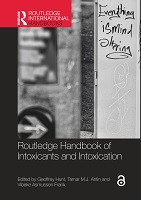Chapter 15 Intoxicants in Warfare
Proposal review
| dc.contributor.author | Kamieński, Łukasz | |
| dc.date.accessioned | 2023-08-15T07:45:56Z | |
| dc.date.available | 2023-08-15T07:45:56Z | |
| dc.date.issued | 2023 | |
| dc.identifier.uri | https://library.oapen.org/handle/20.500.12657/75522 | |
| dc.description.abstract | Since ancient times psychopharmacology has fuelled armed conflicts and sustained fighting men. The presence of psychoactive substances in warfare has taken on two general forms: (1) combatants have consumed various intoxicants recreationally, and (2) drugs have been “prescribed” by military authorities as force multipliers for the improvement of combat performance. The chapter offers a general overview of these two modes of “war by intoxicants” yet with the main focus on the latter. It discusses the particular purposes of the military use of drugs, namely to: inspire courage and provide relief from the stress of battle; overcome fatigue and enhance performance; lessen the effects of war on the psyche; maintain morale and cohesion; and kill the boredom and monotony of military life. Aiming to draw a broader picture of battlefield drugs, it also explores another military role for them: as offensive psychochemical non-lethal weapons. Disorientation, indecisiveness, hallucinations, seizures and other similar intoxication-induced effects offer potential military capacity. Thus the efforts to weaponize toxic plants and psychoactive agents (such as atropine, opium, cannabis, or LSD) attempted to confuse, disrupt, or immobilize an enemy, or subvert and overpower their surrounding populations. | en_US |
| dc.language | English | en_US |
| dc.subject.other | Opioid Agonist Therapy,LGBTQ User,Young Men,ISIS Fighter,Post War,American Psychiatric Association,UK Prison,Syringe Sharing,Great Famine,Tough Training,LSD,Amanita Muscaria,Green Tea Powder,Army Chemical Corps,Healthy Office Workers,Chewing Coca Leaves,Agent Buzz,Psychoactive Agents,Ibotenic Acid,Siberian Tribes,Vice Versa | en_US |
| dc.title | Chapter 15 Intoxicants in Warfare | en_US |
| dc.type | chapter | |
| oapen.identifier.doi | 10.4324/9780429058141-19 | en_US |
| oapen.relation.isPublishedBy | 7b3c7b10-5b1e-40b3-860e-c6dd5197f0bb | en_US |
| oapen.relation.isPartOfBook | b4413dee-bf65-4788-a9f5-9b3d87b31b10 | en_US |
| oapen.relation.isFundedBy | 655a952b-27a1-47c0-8a94-5116e0f6b2bd | en_US |
| oapen.relation.isbn | 9780367178703 | en_US |
| oapen.relation.isbn | 9781032321486 | en_US |
| oapen.imprint | Routledge | en_US |
| oapen.pages | 20 | en_US |
| oapen.remark.public | Funder name: Faculty of International and Political Studies under the Strategic Programme Excellence Initiative at Jagiellonian University | |
| peerreview.anonymity | Single-anonymised | |
| peerreview.id | bc80075c-96cc-4740-a9f3-a234bc2598f1 | |
| peerreview.open.review | No | |
| peerreview.publish.responsibility | Publisher | |
| peerreview.review.stage | Pre-publication | |
| peerreview.review.type | Proposal | |
| peerreview.reviewer.type | Internal editor | |
| peerreview.reviewer.type | External peer reviewer | |
| peerreview.title | Proposal review | |
| oapen.review.comments | Taylor & Francis open access titles are reviewed as a minimum at proposal stage by at least two external peer reviewers and an internal editor (additional reviews may be sought and additional content reviewed as required). |

